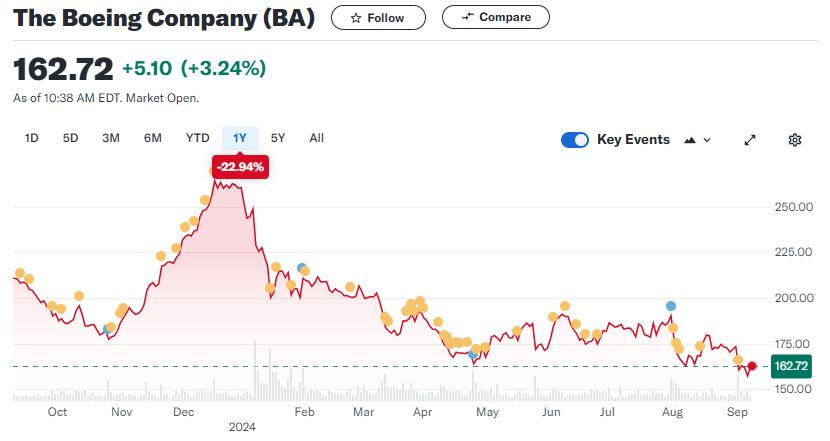
As Boeing’s strike enters its third week, the financial strain on the aerospace giant continues to intensify, prompting serious concerns that the company may resort to diluting its shareholders through a new stock issuance. According to reports from Bloomberg News, Boeing is considering raising at least $10 billion by selling new stock to help alleviate its growing financial pressures. While the company has not confirmed any immediate plans, this move could materialize as early as late 2024, putting investors on alert.

The ongoing strike by over 30,000 members of the International Association of Machinists and Aerospace Workers (IAM) has already dealt a heavy blow to Boeing’s production capabilities, halting the assembly of key aircraft models like the 737 MAX, 767, and 777. This strike is estimated to be costing Boeing between $100 million and $150 million per day in lost production, with aviation analysts forecasting losses that could reach up to $4.5 billion per month if the work stoppage persists.

Boeing had hoped to resolve the labor dispute quickly but was met with resistance when union members rejected the company’s offer of a 30% wage increase spread over four years. As negotiations remain deadlocked, the financial toll is mounting, exacerbating the company’s already fragile balance sheet.

At the same time, Boeing is grappling with significant debt—about $60 billion—while managing operating cash flow losses that exceeded $7 billion for the first half of 2024. The company has been facing challenges on multiple fronts, including a slump in production after a door panel blew off a 737 MAX mid-flight in January, further straining the company’s resources. Adding to its woes, Boeing has nearly $4.6 billion in bonds and loans due by the end of 2025, raising the pressure to stabilize its finances quickly.

Given this backdrop, the potential share issuance may be viewed as a necessary step to shore up liquidity. While Boeing has previously signaled that raising equity was a possibility, the ongoing strike and supply chain disruptions have heightened the likelihood of such a move. In recent remarks, Boeing’s CFO, Brian West, avoided directly addressing whether the company would need to raise debt or equity by the end of 2024, but he emphasized Boeing’s priority of maintaining an investment-grade credit rating. He also acknowledged that stabilizing the factory and supply chain operations had become more challenging due to the labor strike.

Industry experts have long anticipated that Boeing would need to raise cash, with many analysts predicting that the company could issue between $10 billion and $12 billion in equity to ease its debt burden and manage its cash flow issues. However, any such move would dilute existing shareholders’ stakes, which could result in downward pressure on Boeing’s stock price in the short term.

The prospect of a share issuance has been met with mixed reactions from investors. Despite the ongoing strike and looming financial challenges, Boeing shares rose about 1% in early trading following the Bloomberg report, suggesting that investors may have already priced in some level of capital raising. However, long-term investors may be concerned about the potential dilution of their holdings and the impact on earnings per share if Boeing proceeds with the plan.

For Boeing, the timing of the share issuance is critical. With the strike showing no signs of resolution and production setbacks continuing to accumulate, raising capital soon could help the company manage its debt and operating costs as it navigates this turbulent period. On the other hand, delaying the issuance risks further financial deterioration if the strike drags on and production remains stalled.

In the weeks ahead, all eyes will be on Boeing’s negotiations with the IAM union and whether the company can come to a resolution that mitigates the financial damage from the strike. For now, the potential of a stock issuance looms large, with both Boeing and its shareholders bracing for the possibility of dilution as the aerospace giant seeks to stabilize its finances and weather the storm.






